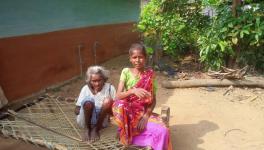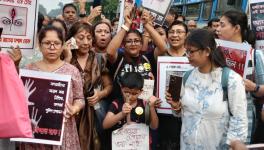Mamata does ‘Volte-face’ on Land Acquisition for Coal Mining Project

Image Courtesy: The Kolkata Buzz
Kolkata: On November 9, Mamata Banerjee announced a Rs 10,000 crore rehabilitation package for land-losers who will be affected by the proposed Deocha-Pachami coal mining project in Birbhum district, jettisoning her oft-repeated stand that land acquisition by the government symbolises forcible takeover.
“There will be no forcible acquisition like it was done in Singur. We will start the project only after winning the trust of the local people,” the chief minister (CM) told the Assembly rolling out the package. Her sustained agitation against the acquisition of land by the Left Front government for the Tata Nano factory at Singur, Hooghly district, from 2006 till 2008 forced the conglomerate to pull out despite 85% completion of the project.
Banerjee has been hanging fire on the Deocha-Pachami project despite several announcements on starting it, particularly in her second term. In a bid to counter the
Opposition’s allegation that not a single big employment-generating venture kicked off during her regime, the project’s promoter and leaseholder West Bengal Power Development Corporation has sought to use the influence of intellectuals/civil society members, Adivasis, and famous personalities to form a committee headed by well-known actor-director Parambrata Chattopadhyay to build a consensus among the stakeholders.
Banerjee, for the moment, is trying to keep the government’s involvement in the project as minimum as possible to avoid a Singur-like fiasco, according to sources. The government will visibly step in when the committee, which is intended to be a facilitator, will build a consensus among the stakeholders and everybody becomes a ‘willing’ land-giver.
The key features of the rehabilitation package are:
* Rs 10 lakh-Rs 13 lakh per bigha depending on the location of the land for the prospective land-loser; the cash offer, the state government claims, has to be viewed against the prevailing market rate of Rs 3 lakh-Rs 5 lakh per bigha.
* The affected families will be provided houses covering a carpet area of 600 sq feet in a new colony.
* An additional Rs 5.5 lakh as shifting charge, maintenance allowance and cost of cattle shed.
* Employment as a junior constable in the state police for one member from each of the affected families.
* A maintenance allowance of Rs 10,000 a month for a year for each of the nearly 3,000 labourers working in the stone-crushing units in the area.
* A one-time grant of Rs 50,000 each for 160 farm labourers in the area. They will be guaranteed work under the MGNREGA.
* The stone-crushing unit owners in the area will be rehabilitated in a nearby industrial park and raw material will be supplied to them free for six months in addition to Rs 50,000 as shifting charge.
State officials have claimed that the package is a significant improvement over the Centre’s Right to Fair Compensation and Transparency in Land Acquisition, Rehabilitation and Resettlement Act, 2013, effective from January 1, 2014—
land-losers will get three-four times the prevailing market price of land in addition to the cost of structures, if any, on the land besides several other facilities. Contending that land acquisition under the Act implied forcible takeover, Banerjee had announced a direct land purchase policy in 2015.
In its November 8 report ‘Police bid to mine goodwill’, The Telegraph that the Birbhum district police have launched initiatives ranging from health care and education to career training and football coaching in Mohammed Bazar, especially on the site of the proposed Deocha-Pachami project, “to assure the tribals that the police are their friends”, according to superintendent of police Nagendra Nath Tripathi.
Good quality non-coking coal deposits suitable for thermal power generation and other industrial consumption were located in 11 mouzas of the five gram panchayats of the administrative block. The deposits, estimated at 2,100 million tonnes, are spread over 11,222 acres. Around 18 villages will form the core project area, where more than 19,000 people of more than 4,000 families stay. About 7,000 of them are Adivasis. Including the estimated rehabilitation cost of Rs 10,000 crore, the total project cost, as of now, is being officially reckoned at Rs 35,000 crore.
According to senior geologist Debasish Saha, a critical issue that the authorities will face at Deocha-Pachami is that the mineable deposits are at great depths, which will warrant the removal of huge quantities of overburden. “Post-removal, the stacking of the overburden will require the earmarking of huge space. Finally, the question will be how to dispose of the overburden,” Saha said explaining why it is a difficult deposit.
Committee member professor Samirule Islam, who teaches chemistry at Shyampur Siddheswari Mahavidyalaya, in Howrah district, said, “I am a son of one of the villages of Birbhum district. My primary concern is that the local people should not have any reason to feel aggrieved because of the coal mining project. Therefore, our first task is to find out what the local population, of which tribals and other backward communities account for a significant percentage, think about the state government’s move.”
Several Adivasi and trade union leaders said that the state administration has unilaterally announced a rehabilitation package without consulting the stakeholders. They are not against industrialisation but have “doubts on several counts”. Rabin Soren, general secretary, Paschim Banga Adivasi Gaonta, said that “the administration says one thing and does another”. “Moreover, there is the issue of farmland, forestland and vested land. We are trying to ascertain from the district authorities what and how much is really being offered. We will take a stand only after getting a clear picture,” he said.
Sunil Soren, general secretary, Birbhum Adivasi Gaonta, said that the “local residents, in general, and the Adivasis, in particular, are aggrieved that the government has announced a rehabilitation scheme without talking to us, without knowing what sudden displacement will mean for us”. According to Soren, when former chief secretary Rajiva Sinha visited the area a few years ago, he did not bother to meet them. “He met the ruling party panchayat members, who stay around eight km away from the project area. The authorities must first talk to the local people, who will be affected.”
Dipankar Chakravorty, general secretary, Centre of Indian Trade Unions (Birbhum district unit), feels that it is not only a question of rehabilitation. “What about health care and education facilities? How will the people’s environmental concerns be addressed? Coal mining in the vast tracts under the jurisdiction of Eastern Coalfields Limited, particularly in the Pandaveswar area, where illegal mining by unscrupulous elements has thrived, has caused subsidence. Moreover, the flouring of the prescribed safety regulations, particularly sand stowing, where mineable reserves were exhausted, cause other problems to the locals,” he said.
Samsuzzoha, the owner of a stone crushing factory and member of Pachami Mine Owners’ Association, said, “Whatever little we know is from the newspapers. Nobody from the government has contacted us. It is an important issue for about 200 factory owners whose business is the source of livelihood for 3,000 people. We will only decide when we are informed about how we can restart our factories post-displacement.”
Meanwhile, Nabanna has decided to wait for 30 days to gauge the reaction of the locals to the rehabilitation proposal and hinted that it will consider genuine suggestions.
The writer is a Kolkata-based senior freelance journalist. The views are personal.
Get the latest reports & analysis with people's perspective on Protests, movements & deep analytical videos, discussions of the current affairs in your Telegram app. Subscribe to NewsClick's Telegram channel & get Real-Time updates on stories, as they get published on our website.
























